
Jubilee Holiday Traffic Delays: 10 Tips To Make Your Fuel Last Longer
Jubilee Holiday Traffic Delays: 10 Tips To Make Your Fuel Last Longer
The RAC have estimated that a whopping 19.5 million leisure travel journeys will be made by car between Wednesday and Sunday, due to the extra-long Jubilee bank holiday weekend.
And with new figures from outdoor holiday booking site, Pitchup, revealing that a staggering 72,393 holidaymakers are booked to camp across the UK this Friday, it seems a lot of us Brits are making the most of the bank holiday, and avoiding airline chaos, with a staycation.
In the midst of the cost-of-living and fuel crisis, drivers may be looking for ways on how to preserve fuel on their staycation journeys - after all, a staycation is often favoured to keep a trip fun yet affordable.
Dan Yates, founder of outdoor holiday booking company, Pitchup, has revealed his expert fuel saving tips to make your staycation commute an easy ride…
1. Only take the essentials
One benefit of travelling to your holiday by car, as opposed to travelling by aeroplane, is that there is no baggage allowance. However, don’t be tempted to over pack, as the excess weight will weigh down your vehicle and inevitably cost more fuel.
Remove any unnecessary items that you definitely don’t need for your break away and only pack the essentials. Plus, it’s a great excuse to give your car a late spring clean.
In addition to this, extra storage external to your car, such as roof boxes, can cause wind resistance and therefore cause drag. In fact, according to the Energy Saving Trust, an empty roof rack adds 16% drag when driving at 75mph. At the same speed a roof box adds 39%, making your vehicle much less fuel efficient.
If you often fall victim to over packing, make a packing list and stick to it so you’re not tempted to grab everything but the kitchen sink.
2. Choose your road trip route carefully on your sat nav
To avoid excessive fuel consumption, most modern day sat-navs come with the option to select the fastest route, even taking traffic into consideration.
Avoiding sitting in standstill traffic can contribute to fuel saving efforts, as your car drives most efficiently when in a higher gear - as opposed to crawling. Not only will this save on fuel, but keeping moving will also help the bank-holiday traffic flow.
Some sat-navs will even allow you to select the most economical route to help you avoid fuel-stealing obstacles such as large hills and heavy stop-start traffic.
There is also an ‘eco-friendly routing’ feature on Google Maps, which instructs drivers on the most economical route to take.
3. Dress appropriately for the weather to avoid using air-con or winding down the window
By dressing appropriately for the predicted bank-holiday warm temperatures, such as light and cool clothing, you’ll be less tempted to switch on the air conditioning or wind down the window.
Air con uses engine power and therefore can burn more fuel. Similarly, winding down the window can create drag on your car, inevitably increasing fuel consumption.
4. Opt for a hand pump to inflate your air beds rather than electric pumps powered by your car battery
An option for inflating your airbeds, if you choose to use them, is a car air pump using your 12V car outlet.
This method, although certainly quick and convenient, may actually be draining your fuel more than you think.
Similarly to using your car’s air conditioning, a car air pump will use engine power and therefore increase fuel consumption.
Why not opt for a method that doesn’t require power from your car, such as a foot or hand pump.
5. Fill up your tank at the supermarket before you go
Starting your travels with a full tank of fuel is always the best practice for convenience, but also in case of emergencies and to avoid breakdown.
It’s also important when travelling to an unfamiliar destination; the last thing drivers want is to take a detour, get lost or stuck in notorious motorway bank holiday traffic, only to have no other option than to fill up at a motorway fuel station.
Supermarket fuel is most often cheaper than branded fuel, so it is better to be safe than sorry.
That being said, drivers running low on fuel on the motorway shouldn’t avoid filling up at all, as this could lead to a potential breakdown.
6. Visit local amenities to avoid short, unnecessary trips
One of the most important aspects of a staycation is the location, especially if there’s fun and exciting local amenities to visit.
Taking multiple short journeys has an impact on fuel consumption, as your car’s engine won’t have a chance to warm up to its most fuel-efficient temperature.
Try to swap short car journeys for walking or cycling instead. This will not only keep fuel consumption and costs down, but it will also benefit your physical fitness and allow you to take in the sights of your holiday.
7. Car share where possible
If you’re going with a big group, try to car share where possible to avoid extra vehicles on the road. By doing this, you’ll be relieving the backlog of bank holiday traffic, as well as saving money and benefiting the environment.
Plus, the more passengers the better for your road trip car games and singalongs - make sure to pack extra journey snacks though…
8. Drive smoothly
More technically on the driving front, one of the easiest ways to save on fuel is to drive in a smooth manner. Be sure to accelerate gently and smoothly, as well as using the highest safe gear. Shifting gears from time to time can also help you to avoid throwing away your fuel.
What’s more, when you approach traffic lights, ease off the accelerator early if the lights are red. Why hurry just to wait?
This is sometimes called 'defensive driving'. Not only should it help you use less fuel, but it tends to be safer too.
9. Inflate your tyres to the right pressure
Having under-inflated tyres means the car’s engine has to work a lot harder to keep the car moving, which burns more fuel. Regularly checking tyre pressure, especially before long journeys, will help keep fuel consumption down and help your tyres last longer.
Check the vehicle's handbook to know what the recommended pressure is for your tyres. The pressure may also be printed on the sill of the driver's door or inside the fuel tank flap. This should be checked at least once a month and always before a long journey.
10. Switch the engine off
Leaving the engine running while a car is stationary consumes more fuel. It’s best to switch the engine off in situations where your car is at a standstill such as in heavy traffic or waiting at traffic lights.
Some newer vehicles are being fitted with stop-start technology which does this automatically.
READ MORE LIKE THIS....
Inflation Hits 40-Year-High: 8 Ways to Keep Your Holiday Costs Down

















